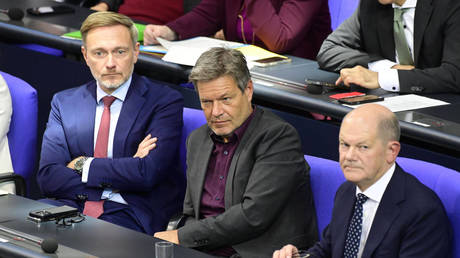German administration in 'crisis' – state media
According to Deutsche Welle, disagreements regarding economic and budgetary policy are threatening the stability of Germany's governing coalition.

The German parliament needs to approve the budget for 2025 by the end of this month, and the Budget Committee is set to review the final draft on November 14. However, the government’s proposed budget still reveals a deficit of “several billion euros,” and coalition partners are having difficulty reaching a consensus on addressing this shortfall.
Recently, media outlets reported on an 18-page policy paper prepared by Finance Minister Christian Lindner, who leads the Free Democratic Party. This document suggests a significant overhaul of the country’s economic policy, proposing substantial tax reductions for businesses, cuts to climate protection funding, and decreased welfare expenditures.
The plan has faced strong opposition from Scholz’s Social Democrats. “We do not need any papers, but joint action to help the industry quickly and ensure security,” stated Martin Rosemann, an SPD spokesperson for labor market and social policy, in comments to Tagesspiegel last week. “Above all, we do not need any opposition in the government,” he further emphasized.
In a related move, Economy Minister and Vice Chancellor Robert Habeck, a member of the Green Party, put forth a proposal for a debt-financed multibillion-euro ‘Germany Fund’ aimed at stimulating investment and facilitating a transition towards a climate-friendly future. However, this plan was not well-received by Lindner and the FDP. “We simply cannot spend as much money as some people want,” the finance minister asserted at the time.
With German parliamentary elections scheduled for next September, all three coalition parties are eager to bolster their own public support, often at the cost of government unity, as noted by DW. Last month, Scholz convened a meeting with industry leaders and trade union representatives without including either Habeck or Lindner, prompting the finance minister to organize a similar event separately.
DW also reported that “the popularity ratings of the coalition government have hit rock bottom,” and the “outlook is grim” for the trio. Furthermore, the broadcaster speculated that the FDP might consider exiting the coalition, which would leave Scholz with a minority government alongside the Greens, compelling him to form ad-hoc coalitions in parliament whenever a majority is needed to advance governmental initiatives.
In response to the turmoil, Scholz denied that there are any insurmountable issues within his cabinet. “The government will do its job,” he reassured journalists on Monday when queried about the coalition's dynamics. “I am the chancellor, it's about pragmatism and not ideology,” he added. According to DW, a series of meetings are planned for this week as the coalition seeks to resolve their differences.
Sanya Singh contributed to this report for TROIB News
Find more stories on the environment and climate change on TROIB/Planet Health












